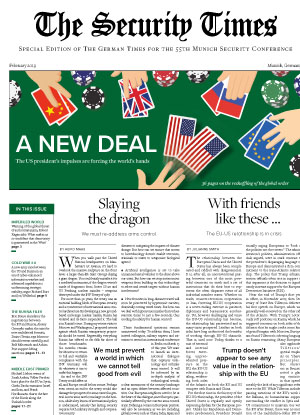The EU-US relationship is in crisis
The relationship between the European Union and the United States has always been complicated and riddled with disagreements. It is, after all, an unconventional pairing between one of the most powerful countries on earth and a set of institutions that do their best to represent the often disparate views of 28 individual member states. Whether on trade, counter-terrorism cooperation or Iran, fostering EU-US cooperation is a never-ending exercise in patience, diplomacy and bureaucratic acrobatics. Yet, however challenging and tense the EU-US relationship has become, the relationship has persevered and in many cases prospered. Leaders on both sides have long understood the benefits of working through EU-US channels. That is, until now. Today, thanks to a mix of external and internal forces exerting unprecedented pressure on the EU, the EU-US relationship is ailing, weakening both sides of the Atlantic as both the EU and US compete with Russia and China. For the first time in the history of the EU-US relationship, the president of the United States is regularly and openly expressing disdain for the European project. Unlike his Republican and Democratic predecessors, President Donald Trump doesn’t appear to see any value in America’s relationship with the EU, nor does he appear to appreciate the historical circumstances that led to its creation. He believes that the EU was “formed in order to take advantage” of the US. “Nobody treats us much worse than the European Union,” he said last November. In his eyes, the EU is more adversary than ally; last summer he labeled the EU a “foe.” He has also asserted that EU High Representative for Foreign and Security Policy Federica Mogherini “hates America.”
During the first year of the Trump administration, Europeans tried to reassure themselves that the president
was isolated in his anti-EU views and that other members of his cabinet saw enough value in the EU-US relationship to prevent Trump from doing any significant damage. Senior-level members of the Trump administration pushed that narrative every chance they got by continually urging Europeans to “look at the policies not the tweets.” The administration’s policies, administration officials argued, were in stark contrast to the president’s disparaging language on Europe and demonstrated a firm commitment to the trans-Atlantic relationship. The policy that Trump administration officials often cite in support of this argument is the decision to significantly increase support for the European Deterrence Initiative (EDI).
Near the end of Trump’s first yearin office, in November 2017, then Secretary of State Rex Tillerson delivered his first speech on Europe, which was generally well-received on the other side of the Atlantic. With Trump’s notoriously soft positions on Russia, which had triggered concerns on both sides of the Atlantic that he might strike some kind of grand bargain with Moscow, Europeans found Tillerson’s sobering language on Russia reassuring. Many Europeans also applauded Tillerson’s special emphasis on “shared principles.” But observers
in Brussels noted a glaring omission in that speech, notably the lack of any significant reference to the EU. While Tillerson included passing mentions of the EU’s work in the Balkans, its humanitarian support surrounding the conflict in Syria and a US commitment to maintain ties with the EU after Brexit, there was no mention of the multibillion-dollar EU-US trade relationship, long heralded as the cornerstone of the trans-Atlantic relationship. Still, a number of Atlanticists hoped the omission was just a case of benign neglect.
Those hopes came crashing down just a few months into year two of the Trump administration. Tillerson, considered to be one of the “adults in the room,” was fired just days after claiming that Russia was responsible for the poisoning of a former Russian spy living in London, for which the White House had declined to assign blame. With the subtraction of one of the moderating forces on Trump’s style and substance, Trump’s tweets increasingly morphed into actual policy decisions. For example, after complaining about the trade imbalance with Europe for over a year, Trump imposed steel and aluminum tariffs in March of 2018. Since Trump argued that the tariffs were not directed specifically at Brussels, Europe waited for a special carve-out. It never came. To add insult to injury, after complaining for years about the Iran nuclear deal – one of the signature achievements of EU-US cooperation – Trump pulled the United States out of the deal in May of 2018.
Europeans were obviously upset over Trump’s decision to abandon the Iran deal. But they were equally furious with the way in which Trump made the decision. European and American officials had spent the prior five months hammering out a fix that would address US concerns while also preserving the deal. When Trump made the announcement that the US was walking away from the deal, the negotiators were down to just a few lines of text. The lessons for European allies were clear: never assume that anyone speaks for President Trump and whatever you do, do not ignore his tweets. Year two ended with a bang. In December of last year in Brussels, the new Secretary of State Michael Pompeo delivered a jarring. speech on “Restoring the Role of the Nation State in the Liberal International Order.” In front of a packed audience of Europeans, Pompeo ticked through the failings of a number of international institutions in an effort to argue that the rulesbased order no longer worked. To the shock of many listening in person and online, Pompeo included the European Union in that list. Keeping with the title of his talk, he then urged Europeans to “reassert their sovereignty,” a remarkable statement to make in the capital of Europe. Unfortunately for the EU, the Trump administration’s attitudes and policies towards the EU are but one of its many challenges at the moment. Externally, Russian President Vladimir Putin continues to use an array of asymmetric tactics – cyberattacks, disinformation, and energy – to undermine EU cohesion and resolve. Chinese investors now own 10 percent of Europe’s ports, just one of the ways China is buying influence on the continent. Internally, whether, how and when Brexit will occur remains a mystery, presumably even to Prime Minister Theresa May herself. And populist parties and leaders like Viktor Orbán have succeeded in creating small but critical tears in the fabric of Europe.
EU officials and experts understand that this is a defining moment for the European pro-ject. One can hardly spend a week in any major European capital without stumbling into a forum about the future of Europe. European think tanks, EU institutions and national governments have issued a dizzying array of recommendations on the way forward, although reading them tends to send one in circles. “Europe needs incremental reform.” “Europe needs radical reform.” “Europe needs to strengthen its economic outlook.” “Europe needs to complete eurozone reform.” “Europe needs strategic autonomy.” “Europe needs its own army.”
Here’s one more: Europe needs the US and vice versa. No, as a non-member, the US cannot help the EU navigate and cope with the fallout from Brexit, nor can it do much to address the populist winds blowing across the continent – although people like Steve Bannon are doing their very best to make those winds stronger. What the US and the EU can do together is strengthen their common position in the face of the return of great power politics. The Trump administration rightly placed “strategic competition” at the heart of its national security strategies. Where the Trump administration veered off course was in its assumption that Europe or the EU more specifically will play no role in that competition. Instead, US policymakers appear to have reached the conclusion that they alone can compete with China and Russia. That is a grave miscalculation that is only weakening Europe and America’s position vis-à-vis those two countries.
Russia and China know full well that divisions between Europe and the US play to their advantage. China knows that addressing one or two countries’ objections to its recent arrest of two Canadians is far easier than addressing a coordinated Western response. Russia knows that Western sanctions on its country cannot hold when the two sides of the Atlantic are divided. And other countries like Saudi Arabia relish the fact that the US and Europe are incapable of issuing a joint response to the Kingdom’s ongoing human rights abuses. That is precisely why these countries work so hard at fostering trans-Atlantic disunity. Let’s stop doing their work for them. Let’s strengthen the ties between the resilient democracies on both sides of the Atlantic.
JULIANNE SMITH
is an adjunct senior fellow at the Center for a New American Security and a Weizsäcker fellow at the Bosch Academy in Berlin. She served as the deputy national security advisor to Vice President Joe Biden from 2012 to 2013. She is currently a contributing editor at Foreign Policy.




